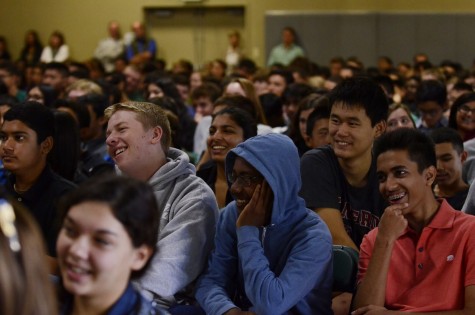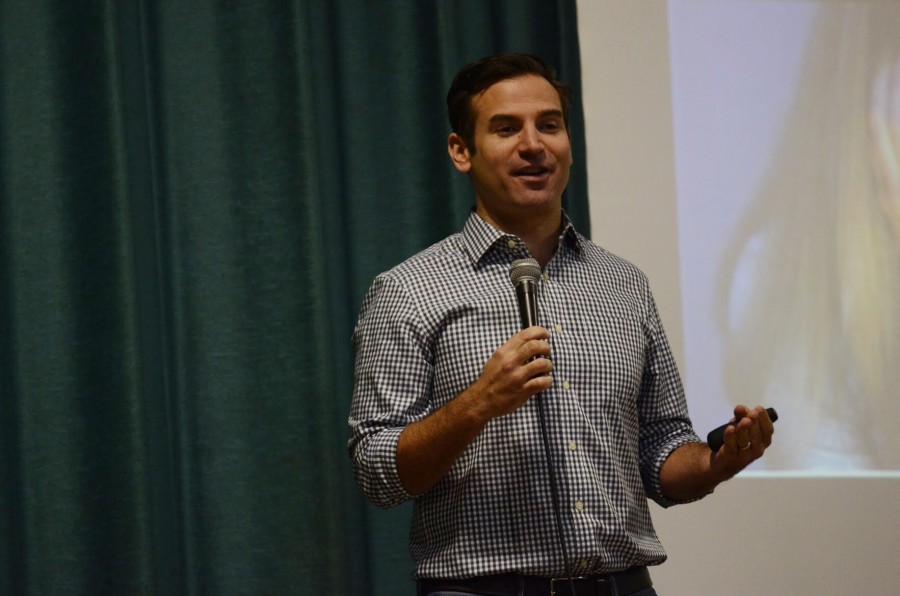Ross Szabo speaks to upper school students about mental health
Human Power Project CEO Ross Szabo gave a presentation on mental health. The presentation took place today morning in the gym.
October 29, 2015
Human Power Project CEO Ross Szabo spoke to upper school students at an assembly today about the management of mental health as an adolescent.
Szabo spoke about issues teenagers face regarding their psychological state. He described his own challenges with mental illness during his adolescence while providing students with methods to cope with their own state of mind.
“Twenty percent of high school students and 25 percent of college students experience a diagnosable mental health disorder,” Szabo said.
After informing students about how to manage the stressors of high school, Szabo advised the audience on how to deal with daily pressures.
“Think of your coping in two ways,” Szabo said “Is it effective or is it ineffective, effective coping builds you, it builds your mental health, your physical health, relationships and yourself.”
Activities such as exercising, socializing and playing video games were on Szabo’s list of ways to cope with the rush of life.
He elaborated on his experiences with self-harm and instability growing up, struggles many students can relate to. Growing up in the small, traditional town of Bethlehem, Pennsylvania, Szabo was ashamed of his mental instability.
Szabo explained that his actions towards others were not reflective of his internal feelings, and how in many cases, psychological sickness can go undetected.
“I didn’t say anything because I thought it was a sign of weakness,” he said.
Szabo then asked the audience for the reasons why people suffering from mental problems do not seek help. Often times, people have trouble opening up and have a false confidence in their personal ability to control their health.
“If you really want to change this issue, you have to find out why people don’t want to talk about it, and you have to work on that with them,” he said.
Rahul Bhethanabotla, a sophomore who attended the presentation, commented on his experience.
“I definitely learned more about the broad stand of mental health, and now I have learned that [psychological problems] can come from a lack of [sleep] and stressors at school,” he said.
Another attendee, sophomore Alisa Su, shared her thoughts.
“It was pretty inspirational, it changed my views of mental illness and mental health,” Alisa said.
Despite the gravity of the topic, Szabo still managed to fill the gym with laughter and smiles. He described his presentation as “the most fun presentation about depression ever.”

Students laugh at some humor in Szabo’s presentation about mental health. The presentation took place today at the gym.
After his talk, Szabo invited students for a Q&A session in the gym for anyone looking for more information.


















![“[Building nerf blasters] became this outlet of creativity for me that hasn't been matched by anything else. The process [of] making a build complete to your desire is such a painstakingly difficult process, but I've had to learn from [the skills needed from] soldering to proper painting. There's so many different options for everything, if you think about it, it exists. The best part is [that] if it doesn't exist, you can build it yourself," Ishaan Parate said.](https://harkeraquila.com/wp-content/uploads/2022/08/DSC_8149-900x604.jpg)




![“When I came into high school, I was ready to be a follower. But DECA was a game changer for me. It helped me overcome my fear of public speaking, and it's played such a major role in who I've become today. To be able to successfully lead a chapter of 150 students, an officer team and be one of the upperclassmen I once really admired is something I'm [really] proud of,” Anvitha Tummala ('21) said.](https://harkeraquila.com/wp-content/uploads/2021/07/Screen-Shot-2021-07-25-at-9.50.05-AM-900x594.png)







![“I think getting up in the morning and having a sense of purpose [is exciting]. I think without a certain amount of drive, life is kind of obsolete and mundane, and I think having that every single day is what makes each day unique and kind of makes life exciting,” Neymika Jain (12) said.](https://harkeraquila.com/wp-content/uploads/2017/06/Screen-Shot-2017-06-03-at-4.54.16-PM.png)








![“My slogan is ‘slow feet, don’t eat, and I’m hungry.’ You need to run fast to get where you are–you aren't going to get those championships if you aren't fast,” Angel Cervantes (12) said. “I want to do well in school on my tests and in track and win championships for my team. I live by that, [and] I can do that anywhere: in the classroom or on the field.”](https://harkeraquila.com/wp-content/uploads/2018/06/DSC5146-900x601.jpg)
![“[Volleyball has] taught me how to fall correctly, and another thing it taught is that you don’t have to be the best at something to be good at it. If you just hit the ball in a smart way, then it still scores points and you’re good at it. You could be a background player and still make a much bigger impact on the team than you would think,” Anya Gert (’20) said.](https://harkeraquila.com/wp-content/uploads/2020/06/AnnaGert_JinTuan_HoHPhotoEdited-600x900.jpeg)

![“I'm not nearly there yet, but [my confidence has] definitely been getting better since I was pretty shy and timid coming into Harker my freshman year. I know that there's a lot of people that are really confident in what they do, and I really admire them. Everyone's so driven and that has really pushed me to kind of try to find my own place in high school and be more confident,” Alyssa Huang (’20) said.](https://harkeraquila.com/wp-content/uploads/2020/06/AlyssaHuang_EmilyChen_HoHPhoto-900x749.jpeg)










